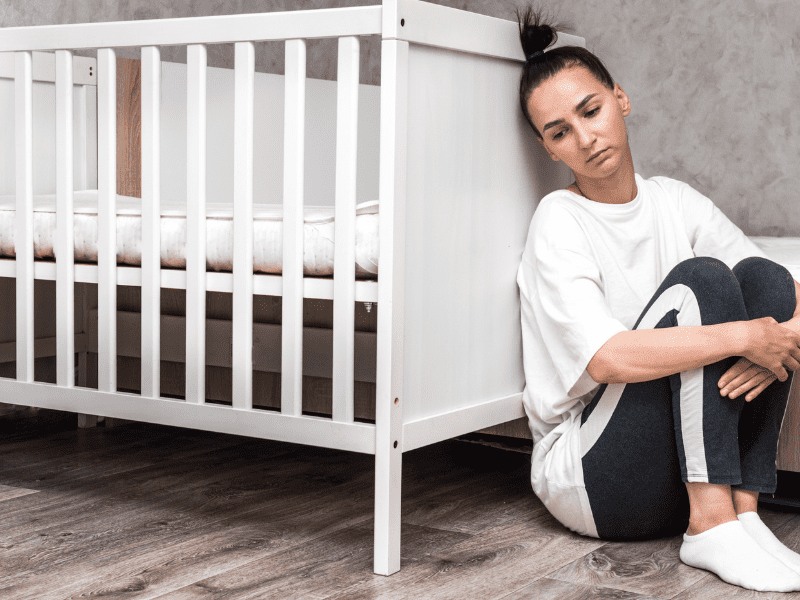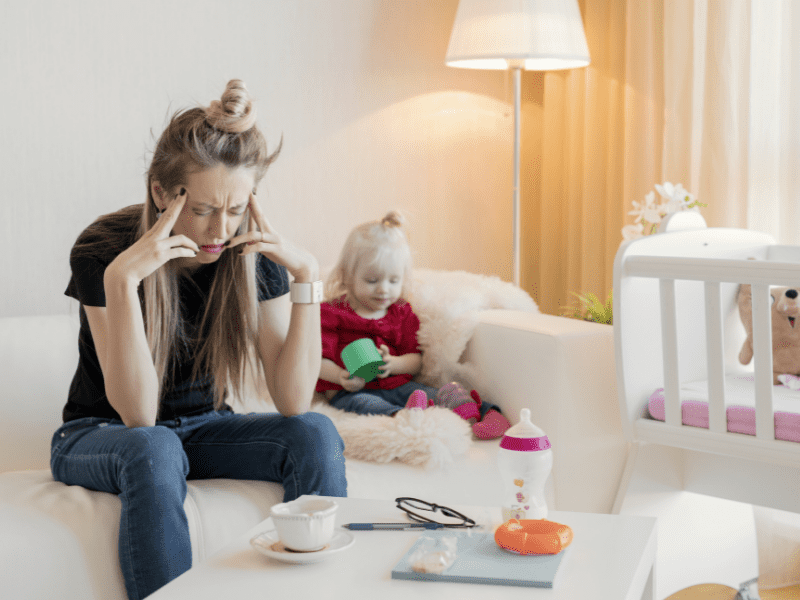Stay at Home Mom Depression: The Truth You Need to Know
For many of us, being a stay at home mom was a dream and a goal for our family, but reality isn’t always the same as our expectations. It’s not uncommon for mothers to experience stay at home mom depression as everything becomes more overwhelming than they expected.
Truthfully, being a stay at home mom didn’t fully meet my expectations.
You imagine all those precious moments with your children, and while those are there, the day-to-day tasks become quite a lot. It feels like a privilege to stay with your kids, even if you have to sacrifice and live on a strict budget, but it doesn’t make it less challenging.
SAHM depression is real, but we don’t talk about it enough.
We feel privileged and thankful we have this opportunity to be a stay at home parent. It makes us feel ashamed to talk about it causing our depression.
But, it’s time those beliefs and the taboo to disappear. Stay at home mom depression is REAL and valid, and we won’t be able to get ahead of it unless we talk about the why’s and how to cope.
Pin this blog for later! ↓

What is Stay at Home Mom Depression?

The first thing you have to understand is that SAHM depression is not the same thing as postpartum depression.
The biggest difference is the timeframe. PPD starts within a specific time frame after childbirth, and while it lasts for months if not treated, it comes from having birth. SAHM depression strikes at any time, even years after having your last child.
It’s no surprise that mothers face depression. Aside from working the equivalent of two and a half full time jobs, we lose sleep and sacrifice many things that mean a lot to us.
Also, being a SAHM often comes with a lack of support from their spouses and family members. The feelings of loneliness dramatically increases the rate of SAHM depression.
The best way to describe SAHM depression is being totally overwhelmed with raising your kids and balancing a household and not totally enjoying it, but being told that you’re so lucky. Then, your guilt takes over because you don’t enjoy it, and you think something is wrong with you.
What Causes Stay at Home Mom Depression?
The life of a parent is unlike any other job; it’s not something that you clock out of at the end of a long day. You have tons of demands and needs, and it ends up being quite overwhelming.
When you’re a stay at home parent, you lose your escape from this reality. Sometimes, even as escape to work for a few hours will give you more patience to deal with your kids the rest of the day and night.
Stay at home parents report feeling sad, helpless, under-appreciated, overwhelmed and so much more.
The truth is that many things lead to and cause stay at home parent depression, but here are some potential causes:
- Feelings like a failure
- Comparison
- Financial stress
- Putting too much on your to-do list
- Facing criticism
- No close friends or family
- Difficulties with your child
- Lack of appreciation
- Striving for perfection
Large life changes increase the risk of depression, so having a baby or leaving a job could be triggers. You often feel isolated or a loss of purpose or identity when compared to your life before staying home with your kids.
Don’t forget the world around you!
Political issues, the pandemic, feelings of uncertainty about the future, and health concerns lead to an even larger feeling of emotional strain on parents.
Signs of Depression in Stay at Home Parents

So, how do you identify stay at parent depression? It has a few signs to remember.
- Feeling fatigued all day, even if you have consistent full nights of sleep.
- Having no motivation to do anything.
- Feeling overwhelmed by even simple tasks
- Feeling alone and hopeless
- Having thoughts of suicide
- Trouble sleeping
- Mood swings
- Irritability
- Frequent, unexpected emotional outbursts
How Common is SAHM Depression?
A 2012 Gallup poll indicates that around 28% of mothers experience some degree of depression related to being a SAHM. This sector is far more likely to be diagnosed with depression than mothers working outside of the home.
It’s important to note that more dads than ever are staying at home than before. All stay at home parents face depression, but most studies focus on mothers for the time being.
4 Things That Make Stay at Home Mom Depression Worse
Many factors that lead to SAHM depression are out of your control, but controlling your thoughts and expectations are one way that you can make a difference.
We often have thoughts or beliefs that are inaccurate, and those lead to our feelings of inadequacy. Then, as those feelings continue, we start to believe them. They add to our depression and low self confidence in ourselves and our ability to be good parents.
Moms tend to beat themselves up – I know; I do it sometimes.
Here are some of the thoughts and beliefs mothers have that might make your stay at home mom depression worse.
Thinking You Should Want to Be With Your Kids All The Time
I used to judge mothers who excitedly talked about wanting to be away from their kids – they decided to have kids. Why are they excited to be away from them?
Now that I have three kids, I realize that taking care of kids is hard work. It’s a job that is 24/7, and it’s natural and normal to want a break. Everyone needs time to themselves, and it’s also vital to have time with your spouse without your kids.
Related: The Best (and cheap!) At Home Date-Night Ideas
That’s why many mothers opt to work, even if they financially don’t need to, because they like to have time away to be an adult!
Let’s normalize that it’s okay to not want to be with kids all the time. It’s healthy and normal to need time to yourself to be an individual.
Believing Other Moms Have It All Together
When you spend time on social media, looking at all the adorable photos of other moms’ kids and their amazing life, you start to feel like other people have it together, but you don’t.
Comparison will make you feel like you’re failing miserably. The reality is that other moms make different priorities than you, and social media only shows the amazing parts of their lives.
Who wants to share that they flipped out and screamed at their kids?
That their sink is overflowing with dishes for two days?
That their living room looks like an atomic bomb dropped?
Those posts don’t make for likes and loves on social media, so they’re skipped for curated posts of happiness.
Talk to other moms about your reality, and I guarantee they will share that they have the same things. Sharing your frustration with the mess will lead to nods and agreements and probably plenty of laughter.
Assuming You Should Find Total Fulfillment in Being a Mom
Being a mother is a full time job, even if you work outside the home, so when you pick to be a SAHM, you start to believe that it should fulfill everything.
Plus, you have well-meaning people telling you to enjoy all the moments because it goes so fast. While that’s true, it leads to feelings of wondering why you aren’t enjoying it so much.
It’s important to remember that motherhood is one of most important vocations, but it doesn’t define you. You are a person and an individual outside of being a mother, and that person has desires, plans, goals, and hopes for the future separate from being a mother.
Fostering the individual inside of you will lead to more fulfillment aside from just thinking being a mom is the end all be all.
Putting the Kids’ Needs First Always
Here’s another thing that you might do that makes your SAHM depression worse – always putting your kids’ needs first.
Being a parent involves sacrifice – without a doubt. You lose so many hours of sleep; I don’t even want to try to calculate that. I might cry.
You might struggle to find time to shower and forget reading as much as you used to enjoy. Now, you’re a glorified chef, chauffeur, and maid.
However, in the process of taking care of your kids, it’s easy to forget that your needs are just as important. Sure, your kids need the vital stuff like being fed, clean with clean clothes, and a place to sleep.
However, you need to take care of your kids, and sometimes, kids have to learn to wait so their mother can have something she wants and needs in life too.
How to Handle Stay at Home Mom Depression

Many of the causes of SAHM depression center around the problems finding time to practice self-care. You also might have a lot of guilt.
Guilt that you aren’t doing enough (in your eyes) or that you’re taking time away from your kids to focus on yourself.
Guilt that you fed them McDonald’s for the third time that week.
Mothers are often reluctant to talk to their healthcare providers around needing depression medications because they feel guilt that they are depressed at all. They’re living someone else’s dream – why should they feel depressed?
While seeking medical help is always a smart idea – taking medication is NOT shameful – here are some other ways to cope and handle stay at home mom depression.
1. Connect with Other Moms
One of the biggest keys to coping and dealing with SAHM depression is connecting with other moms! Finding a group of mothers or a few support groups will help you feel like you aren’t alone – you aren’t! It also helps you get out of the house and become active in your community.
2. Journal or Write about Your Feelings
Writing your feelings is a coping technique that helps many individuals struggling with their mental health. It is one technique that helps with healing.
You don’t even have to write privately. Some mothers find it therapeutic to blog or use social media to share their feelings and connect with other mothers.
I found that writing often gives me a way to reflect later on my feelings. If I’m upset, I write what I’m feeling, and it gives me time to go back later and think about everything.
3. Give Yourself Alone Time
It’s easy to fill every waking hour with something that needs to be done for your family or kids, but don’t. Dedicate time to you, at least one or two hours per day, even if it’s watching your favorite TV show or reading a book.
4. Find Hobbies and Things You Enjoy
It’s easy to get so caught up in all the day-to-day tasks as a SAHM that you forget about YOU.
You are still an individual and a person with interests and passions outside of being a mother. Find hobbies and pursue other interests, and make sure that’s a priority for you. Don’t ever feel guilty about forgoing certain tasks around the house to work on your hobbies.
Your mental healthy and interests matter as well!
Related: 25 Hobbies for Stay at Home Moms You Need to Try
5. Get Adequate Sleep
Mothers experience sleep deprivation on a regular basis, but it’s also a leading factor in declining mental health. If you cannot get enough sleep, then your rate of depression and anxiety will increase.
However, it’s not as easy as it sounds.
Getting enough sleep requires communicating your needs to your partner and working together to find ways to get more sleep. Find time to take naps and go to bed early rather than binging Netflix late into the night.
6. Exercise Regularly
Did you know that exercising naturally boosts your mood? It helps to reduce symptoms of depression and anxiety, so start walking around the block regularly.
Finding the right routine that you’ll stick to takes time, but once you know what works, exercising regularly becomes a lot easier. Combine finding a mom group and working out!
Related: How I Make Time to Exercise with Kids: 10 Real-Life Tricks
7. Seek Out a Therapist
Going to a therapist is never a bad idea, nor is it shameful to decide you need a therapist or a counselor. Talking to someone help with feelings of depression, especially if you have clinical depression, classified as two or more weeks of serious depression.
8. Work on Creating Realistic Expectations as a SAHM
The season of little kids is short, but that doesn’t mean it’s not also some of the hardest years of your life as well. It’s okay and normal to have hard days, weeks, and months, and feeling otherwise sets up unrealistic expectations as a stay at home mom.
Don’t expect to love motherhood all the time.
Don’t think your motherhood and family life will look Pinterest-perfect.
Stop comparing what you think about other’s reality and yours; no one knows someone else’s reality and life.
It’s not uncommon to face stay at home mom depression, but that doesn’t mean you have to deal with it forever. By talking to your doctor and working on your expectations as a SAHM, you can cope and learn how to handle (and beat back) your feelings of depression.






